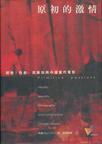原初的激情
出版时间:90 出版社:遠流出版社 作者:周蕾 页数:320 译者:孙绍谊
Tag标签:无
内容概要
在本書中,周蕾考察了令世界各地觀眾稱羨的中國當代電影。她認為,中國電影屬於某種從書寫文字到技術化視覺意像的符號系統轉型史,這一轉型伴隨著現代性歷史,但卻總是被壓抑了。 在具體分析吳天明、陳凱歌和張藝謀的《老井》、《黃土地》、《孩子王》、《紅高粱》以及《大紅燈籠高高掛》等影片前,作者以視覺性為切入點,清晰而令人信服地重新解讀了二十世紀中國的主要事件。 當代中國導演們究竟是如何對待諸如社群、國族、工作、愛戀、學習、革命、自然以及性別等問題的?更重要的是,他們是如何對待電影製作經驗本身的
作者简介
周蕾(Rey Chow),生于香港,美国史丹福大学博士,现任教于美国布朗大学比较文学系及现代文化与媒体系,为该校Andrew W. Mellon人文科讲座教授。中文著作尚包括《妇女与中国现代性》(麦田,1995)、《写在家国以外》(牛津,1995)等,并已被译成英、法、日、韩、德、西班牙文等多国语言。
图书封面
图书标签Tags
无
评论、评分、阅读与下载
用户评论 (总计7条)
- Rey Chow's writing, as well as the binding of the book is so beautiful and thought-provoking! Self-identified as barbarian foreigner from colonial Hong Kong, Rey deconstructs the "invisible violence" of the viciously circular emotional complex that she describes as "primitive passions."
Here I'm quoting some spark notes from the Chapter - Decentering the Sign "China"
Decentering the Sign "China"
P48 Chinese film has moved beyond the Fifth generation: the emotions peculiar to the generation of directors who, as youths, lived through the Cultural Revolution are no longer those that plague the new filmmakers of the 1990s.
P49 Films of the 1980s and early 1990s deserve special attention for several major reasons: First, they represent some courageous efforts in reconceptualizing 概念重建 film culture when making good films is still very difficult in China. Second, they continue to signify a much-needed general resistance toward the domination of media representation by the Chinese government, which since June 4, 1989, has been enthusiastically sponsoring big-budget movies about communist revolutionary history, military achievements, and heroic figures. Third, these films are instructive as ways of deconstructing a cultural centrism of which they, as well as many of their evaluators, are in fact a part.
The "primitive" is not only a central part of repressive official discourse but also a prevalent and pervasive obsession that structures the very "oppositional" critiques of official discourse we have seen in the majority of Chinese films and criticism to date.
Chinese film directors' obstinate discourse of nativism against acculturation.
Chinese intellectuals often say that "China" is beyond what "Foreigners" can understand; it is not that foreigners cannot understand "China" but that "China" is that ultimate something - that ultimate essence beyond representation.
P50 It's a commonplace that Chinese intelligentsia has had a more compliant attitude toward totalitarianism than intelligentsia in Eastern Europe.
The current situation in the People's Republic of China, in which the earlier forms of brutal military violence is increasingly replaced by a repressive, invisible violence partaken of by intellectuals themselves, a "velvet prison," a prison with an aesthetic all of its own.
P51 The "velvet prison" is the name not only of Chinese intellectuals' complicity, through self-censorship, with the Chinese government's authoritarianism inside China, it is also the sign of Chinese intellectuals' indifference toward China's imperialism vis-a-vis peoples who are peripheralized, dominated, or colonized by mainland Chinese culture, in places such as Tibet, Taiwan, and Hong Kong.
Preoccupied only with China's "victimization" and "marginalization" vis-a-vis the West, contemporary Chinese intellectuals, in particular many of those from the People's Republic, specialize in cultivating the form of primitive passion that is sinocentrism 大中国主义 or Chinese chauvinism.
- 我得承认让我来写这整本书的书评那是绝对不可能的。我相信其实作者的基本观点是很明确的,但为何写作和论证过程会显得如此繁复,如此光怪陆离,如此玄乎其玄呢?这个问题我自己的答案大约是我不是这门学科中的人,不精也不习惯于此,何况作者本身还强调本书具有跨学科的意义(只是从我个人感觉角度上来说,我觉得很多内容怎么看都有点扯淡,所以我也只能说我的确不是此中人);其二,我想我和翻译者也很难磨合。她呈述出来的周蕾的东西使我已经不敢再去看原文。不想讲这里面的缘由了。
大体上翻了翻该书,详读了第一部分和第二部分第一章,接下去就“不忍卒读”了,但这是在同情我自己。第一部分总体而言还是给我一些启发的,所以我也愿意给一个推荐的星级,鼓励那些该学科内的人努力钻研解读它。这里也只是写写那些对我有所启发的点。
对我而言最为重要的启示是周蕾在该中文版第25页写到,视觉意象不具备书写文字所特有的内化与抽象性,它是一种在不同系统下运作的指涉模式。这句话有比较多的术语不太懂,比如指涉模式这样的东西;但如果我没有理解错误的,根据上下文的贯穿的想法出发,简单的说,视觉意象可以被观察者多样化的阐释。从鲁迅看幻灯片(内容是鲁迅对外宣称,或至少目前的许多当代文学史研究认为他弃医从文是因为一次经历,在日本学习时看到幻灯片上中国民众麻木地看着自己的同胞死在敌人的刀枪下无动于衷,由此他认为更重要的是用笔唤醒中国人的精神)一例中,作者认为鲁迅的解释本身已是一种企图用语言来叙述无声的视觉事件的尝试(作者认为无声视觉意象本身可以被多方解读,并不会只有一种解读方法和内容,而鲁迅表达出他对这个无声视觉意象的感觉事实上是他本人已经在做诠释了)。作者由此认为媒体作为中介的力量,(我以为部分可以作为多元感情的载体,为不同人的解读提供文本材料),(又)可以放大扩大视觉冲击力,加剧意象造成的感情印象,比如说鲁迅可能早已认识到中国人的"麻木",但幻灯的意象加深了这种印象,促使他采取行动。
另外一个比较重要的点,与作者论点相关的是,周蕾认为东西方关系中“原初主义”问题不仅限于西方对非西方的剥夺,更是在形式创新上表明文化生产的等级关系。第三世界“现代化”的过程实际是“原初化”的运动过程(这个是我理解得出的,也许作者并无明确是这个意思。。),将原始材料或受压迫阶级的素材攫取来呈述新的观念。她认为中国知识分子并非受“启蒙”后选择以关注受压迫阶级来革新其写作,而是他们发现弱势群体中有他们迷恋的源泉,能够帮他们在主体和形式上激活,复兴其文化生产,使之“现代化”。事实上,这个观点似乎在之后的几篇关于中国电影的评述中都得到阐述,但应该远不只此。 - 尼克布朗有篇文字评论过 你所谓周蕾的“扯淡”,他的中心论是针对周蕾的电影人种志。主观觉得现在的电影评论沿着西方批评路数,模式化好严重,真的是好难读,乱七八糟的语言,或者是翻译的问题吧。
- 好段时间没读文化研究的东西了,比较生疏...有空再看看在给反应....
- 翻译真是看得让人想哭啊。港式翻译,特别别扭,海德格尔还要说成海德格,哎哟个亲娘诶
- 她的东西就是挺扯的,我常常感觉她分析的文本跟我看的文本不是一个东西。她是典型的以所谓”理论“见长的学者,之所以这么有名,一个原因是海外搞中国电影和文学的学者一般不这么”理论“。
- 哦...
